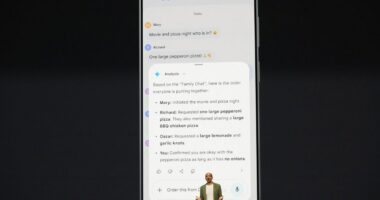Share this @internewscast.com
This is an excerpt of Sources by Alex Heath, a newsletter about AI and the tech industry, syndicated just for The Verge subscribers once a week.
The billboard in question didn’t display “Listen Labs,” nor did it mention anything about recruitment. It was merely a blank white canvas with a series of grouped numbers suspended over Nob Hill in San Francisco.
Last month, Alfred Wahlforss, the CEO of the startup, revealed on X that anyone who deciphered the code and passed a follow-up challenge would win a trip to Berlin and access to the prestigious club Berghain’s guest list.
One of the most intricate hiring strategies from a tech startup in recent times proved successful, according to Wahlforss. Within days, the billboard captured millions of online views, generated media attention, garnered 10,000 email sign-ups, and resulted in approximately 60 interviews with prospective candidates.
Based on my recent discussions with Wahlforss and other startup leaders, it has become evident that luring top technical talent is increasingly difficult, even for companies with substantial funding. Wahlforss shared, “We are heavily investing, not in advertising our company per se, but in promoting ourselves to engineers,” noting his company has secured $27 million from Sequoia. He explained, “It has become exceedingly hard to recruit competent individuals. I know a high school dropout who works at OpenAI earning nearly $2 million annually.”
“You spend hours with people who end up rejecting you and just go to Anthropic. It’s very, very painful.”
Wahlforss recounted an incident involving a candidate who was passionate about cycling. His cofounder surprised him with a high-quality carbon road bike, which persuaded the candidate to decline competing offers. However, Wahlforss admitted it’s often very challenging to rival major AI and Big Tech entities. “You spend countless hours with prospects who ultimately choose to join companies like Anthropic. It’s incredibly frustrating.”
Similar stories of rejection abound. Austin Hughes, CEO of Unify, an AI sales platform that has raised over $50 million, even commissioned a painting for a preferred candidate. However, OpenAI’s offer of triple the salary Unify could afford led the candidate to accept the higher pay package and keep the painting.
Jesse Zhang, the CEO of Decagon, is feeling the same squeeze despite running a fast-growing startup currently valued at $1.5 billion. “It’s one of the things I’m thinking about day to day,” he told me when I asked about the difficulty of recruiting. Decagon has pulled the classic levers to attract candidates, such as hosting fancy dinners with its investor, Accel, and offering courtside tickets to Warriors games. Zhang said he even drove to the South Bay recently and met with a candidate’s family.
However, the most reliable tactic he mentioned was not flashy at all: “All the senior hires we’ve made in the first 100 people were all just people I knew.” Hughes said his team at Unify exports their LinkedIn networks into a shared Google Sheet and creates an index match to find the best candidates with the most employee connections.
So who are all these companies chasing? Across my conversations, a consistent archetype emerged: an “AI product engineer” who can wield the latest AI tools at blistering speed without “shipping slop” and can also do the job of a product manager. “The intersection of being highly technical and also being product-centric is very small,” according to Wahlforss. He estimates the pool to consist of a couple of thousand people at most, each with “ten offers” at any given moment.
While OpenAI and Anthropic are still seen as two of the most desirable places to work for these kinds of people, a refrain I heard repeatedly from founders is that the big AI labs are quickly becoming indistinguishable from the rest of Big Tech. As Wahlforss framed it, the edge for a startup is telling a recruit they can be “almost like a mini founder” and “build products end-to-end.”
Top-tier investors and recognizable brands help at the margins, but another consensus was that a fancy cap table matters less now because so many startups are well-funded. Zhang thinks the hiring frenzy won’t last forever, though. There’s “too much capital,” too many AI startups, and at some point, the bubble will burst, he said. The trouble is nobody knows when.





